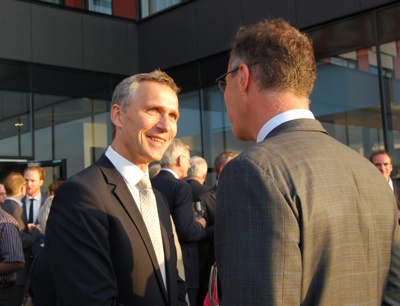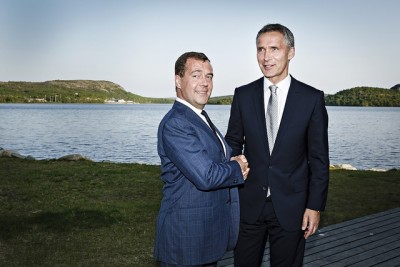Prime Minister Jens Stoltenberg was welcoming dignitaries from around the world to the small northern Norwegian city of Kirkenes this week, to celebrate 20 years of Euro-Arctic cooperation in the Barents region. Now his challenge is to keep the cooperation going, at a time when the government of the region’s heavyweight, Russia, has been reverting to some authoritarian ways.

If the weather was any indication, Stoltenberg could hope for sunshine policies to further warm up relations with Russia and the other heads of government in the Barents region. Kirkenes was literally basking under perfect weather and Stoltenberg was too, as he greeted everyone from organizers of the Barents Summit to members of a large press corps and his fellow government leaders. Among them arriving in Kirkenes on Monday were Russian Prime Minister Dmitry Medvedev, Finnish Prime Minister Jyrkri Katainen, Iceland’s Prime Minister Sigmundur Davio Gunnlaugsson and the foreign ministers of Denmark and Sweden, Villy Søvndal and Carl Bildt.
Their official goal was to sign a new “Kirkenes Declaration” like the one that Stoltenberg’s own father, Thorvald Stoltenberg, spearheaded back in 1993 when he was Norway’s foreign minister. Kirkenes, home of the Barents Secretariat, has become an important hub of Barents activity and the declaration marked the start of formal cross-border cooperation in the Barents Euro-Arctic Region.
Before getting down to business on Tuesday, they all gathered at a festive reception at the Thon Hotel on Kirkenes’ waterfront Monday evening, along with local mayors, some members of Stoltenberg’s government (including Fisheries Minister Lisbeth Berg Hansen who’s from Northern Norway), heads of indigenous peoples groups and non-governmental organizations and several diplomats. Among them was the ambassador to Norway from China, which recently was granted observer status at the Arctic Council. His presence was a sign that a diplomatic freeze between Norway and China may be thawing, and at the very least that China is keen to follow Arctic developments, benefit from new energy supplies and trade routes, and exert some influence.
All eyes, however, were on Stoltenberg and Medvedev, although the latter failed to mingle with guests the way Stoltenberg did. After emerging from a “working dinner,” Medvedev first appeared to head upstairs before briefly returning and then retreating to the conference room area. While Stoltenberg made the rounds and posed for photos with guests, Medvedev didn’t exactly join the party.

While Norway and Russia generally seem to enjoy good relations along with their shared border, there has been some tension since the heady days of Medvedev’s official visit when he was Russia’s president, followed by his surprise willingness to agree on a new borderline in the Barents Sea that clearly delineated territory for the first time. Stoltenberg even acknowledged to the audience at a pre-dinner concert in Kirkenes Monday evening that “not everything is as it should be,” and he told reporters that Norway was making ongoing efforts to encourage Russia to lighten up on the non-governmental organizations that have struggled with restrictions on their activities of late. There was some relief this spring when Russia, after protests from Norway and other Barents governments and Sami authorities, reversed its dissolution of RAIPON, an umbrella organization for indigenous peoples in northern Russia. They were well-represented, and in colourful dress, at Monday’s reception, and cooperation among the indigenous groups across Barents borders will be part of the new Kirkenes Declaration.
Its overall goals seemed less than concrete, with Stoltenberg saying they would “address future opportunities and challenges,” but the new declaration was also hoped to include some commitments towards creating new business opportunities. Norway’s part of the Barents region is rich in energy and mineral resources, for example, with the northernmost county of Finnmark enjoying boom times of late and extremely low unemployment. Kirkenes’ jobless rate is only “about 1.5 percent,” claimed one local mining official, “and that 1.5 percent are those sitting in the pub. They don’t want to work.”
Local business wants even more cross-border cooperation and dreams of projects like exploiting the potential of Kirkenes’ ice-free port in connection with new northern shipping routes. Others point to the transport potential of extending Russia’s northernmost train line by just 40 kilometers to Kirkenes’ harbour. Then liquified natural gas from the Barents could be shipped on rail cars south to Russian and European markets, while more bulk products could be shipped out via the sea.
Stoltenberg typically stressed the positive developments already seen in the Barents, claiming that “it’s just incredible” how much the area around Kirkenes, for example, has changed in the 20 years since the first Barents Declaration. He claimed the declaration has enhanced confidence among Barents governments “and now we want to take the Barents cooperation further. The area has gone from Cold War fears to cooperation and optimism. That’s what we’re celebrating here today.”
Views and News from Norway/Nina Berglund
Please support our news service. Readers in Norway can use our donor account. Our international readers can click on our “Donate” button:

